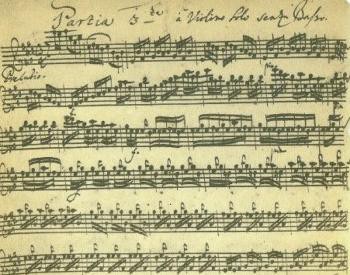Real G’s Move in Silence Like Passacaglia
by Mary Kefferstan

…or, How Bach Can Change Your Life.
One of my former piano professors once said that if you were to sit down and copy out all of the music Bach ever wrote, it would take fifty years. Fifty years! Just to COPY it, not to bring it to life in your mind. The sheer volume of music he wrote — and its overall impeccable-ness — is astounding. Plus, he had twenty kids! How did he have time to go to work, write all of that music, and be a loving husband and father? While he was alive, Bach’s genius went unappreciated, and he was thought of as old-fashioned. All his kids were like, “Oh Dad, you’re sooo lame, all that stuff you write is sooo old, nobody really cares about counterpoint anymore. Can I skip church this week and go hang out with my friends?”
So, listen to this. Here is his Chaconne, or One of the Most Perfect Pieces of Music Ever Written. Watch an elderly Jascha Heifetz completely kill it on the first take.
Yes, I know it’s long at 12:55. But it’s so worth it, and SO GOOD. (Ed. — And available on Amazon.) Plus, the section that starts at 6:30! How can it get any better than that? If you’re looking for any semblance of peace and serenity in this insanely stressful world, there you go.
This is the last movement of his Partita No. 2 for violin, in D minor. A chaconne is a series of variations built on a repeating bass line (the term is interchangeable with passacaglia [pass-a-CAL-yuh], hence the title of this post). In other words, the basic harmonic progression is the same throughout, but what happens above that is where all the fun is. This is a classic example of it being about the journey and not the destination. Sure, it’s the same chords over and over again, but it’s what he does with them that’s so amazing. Here’s where we get into the territory where words fail, and I don’t think I could say it any better than Johannes Brahms, so I’m going to let him tell you how mind-blowingly wonderful this piece is:
“On one stave, for a small instrument, the man writes a whole world of the deepest thoughts and most powerful feelings. If I imagined that I could have created, even conceived the piece, I am quite certain that the excess of excitement and earth-shattering experience would have driven me out of my mind.”
If you would, for just a second, allow me some poetic license. Somehow, three hundred years ago, Bach wrote the biography of all of us. Imagine that the bass line/chord progression is … YOU. There’s something constant about you throughout your life, but also, above that foundation, you wake up every day and live. You have experiences, you get your heart broken, you drink too much Qream and make horrible mistakes, you feel rapturous joy and terrible sadness. The surface of your life changes, but underneath it all, there is still your you-ness.
Mary Kefferstan is a pianist. She loves art, Herman Melville, and daydreaming about places to live besides Ohio.